Instagram Hashtags: Ultimate Guide [+101 hashtags for 2023]
Instagram hashtags can make or break your Instagram strategy. Use them correctly and you’ll get your posts seen by more people.

Instagram hashtags can make or break your Instagram strategy. Use them correctly and you’ll get your posts seen by more people.
Instagram hashtags can make or break your Instagram marketing strategy. Use them correctly and you’ll get your posts seen by more people likely to be interested in your products or brand.
But use the wrong and you can actually do damage, from annoying potential followers to getting penalized by Instagram’s algorithm.
To use hashtags for Instagram effectively, you need to understand exactly how they work, and put some thought into a strategy.
You’re in the right place to do just that. Watch our video below, or read on!
Bonus:Download a free checklistthat reveals the exact steps a fitness influencer used to grow from 0 to 600,000+ followers on Instagram with no budget and no expensive gear.
A hashtag is a combination of letters, numbers, and/or emoji preceded by the # symbol (e.g. #NoFilter). They are used to categorize content and make it more discoverable.
Hashtags are clickable. Anyone who clicks on an Instagram hashtag or conducts an Instagram hashtag search will see a page showing all the posts tagged with that hashtag.
Hashtags are an important way to expand your Instagram audience and get morereach. When you use a hashtag, your post will appear on the page for that hashtag. If you use a hashtag on your Story, it could be included in the relevant hashtag Story, which also appears on the hashtag page.
People can also choose to follow hashtags, which means they could see your hashtagged post in their feed even if they don’t follow you (yet).
Instagram hashtags can be a great way of building community online so people are motivated to engage with your brand. For example, as the way people work out suddenly changed in 2020,Nike Los Angelesused the #playinside hashtag to feature local people getting active in their homes.
All that being said, times they are a changin’. We recently ran an experiment looking specifically at the effectiveness ofInstagram SEO vs Hashtagsin 2023. And the results, well let’s just say they were eye-opening.
Check out the article or watch the video below to see what we found:
These are the top 50 hashtags on Instagram:
Popular B2B Hashtags
Popular B2C Hashtags
Keep in mind that the most popular Instagram hashtags are not necessarily the most effective.
A large number of posts may mean lots of people follow that hashtag, but it also means there’s a ton of content on it and your posts might get lost. Instagramsuggests使用流行的组合和利基标签to reach different audiences, from broad to specific.

Everything you need to make engaging content. Post templates, an AI hashtag generator, and access to Canva and Grammarly Pro in Hootsuite.
Get 60 days for $0Instagrambreaks hashtags downinto nine distinct types:
These are basic keywords to describe your product or service, like #handbag or #divebar
These get a little more specific, showing where you fit in the context of your industry, like #travelblogger or #foodblogger
Communities exist on Instagram, and these hashtags help you find and join them. Think #gardenersofinstagram or #craftersofinstgram
These can refer to real holidays or seasons, like #summerdays, or they can be used for all those National [Thing] Day holidays, like #nationalicecreamday or #nationalnailpolishday
Even if you geo-tag your Instagram post, it can still be a good idea to include a hashtag that refers to your location, like #vancouvercraftbeer or #londoneats
Every day has plenty of its own hashtags, from #MondayBlues right through to #SundayFunday. We created awhole list of daily hashtagsfor you to choose from if you’re looking for an easy source of hashtags to add to your posts.
These hashtags combine elements of product hashtags, niche hashtags, and community hashtags. Basically, they’re phrases people use on Instagram to connect to existing communities in a slightly insider way, like #amwriting or #shewhowanders
Perhaps the best-known acronym hashtag is#TBT for Throwback Thursday. Other popular acronym hashtags include #OOTD for outfit of the day, #FBF for flashback Friday, and #YOLO for you only live once.
These hashtags can include emojis on their own, like #????, or words or phrases with emojis attached, like #sunglasses????.
Branded hashtagsare another great option for businesses on Instagram. We’ll get into more details on those later in this post.
You can includeup to 30hashtags on a regular post, and up to 10 hashtags on a Story. If you try to include more, your comment or caption won’t post.
That said, just because youcanuse that many hashtags for Instagram doesn’t mean youshould. There’s no right number of hashtags for every business, or even for every post by the same business.
Theconsensusis that about 11 hashtags is a good number to start with. But the most common number of hashtags to use on Instagram isbetween 3 and 5.
You’ll need to do sometestingto determine what works best for your particular business.
When you’ve spent time crafting agreat Instagram caption, you may not want to end your post with a prominent collection of hashtags. Fortunately, there are a couple of easy ways to make your hashtags less visible.
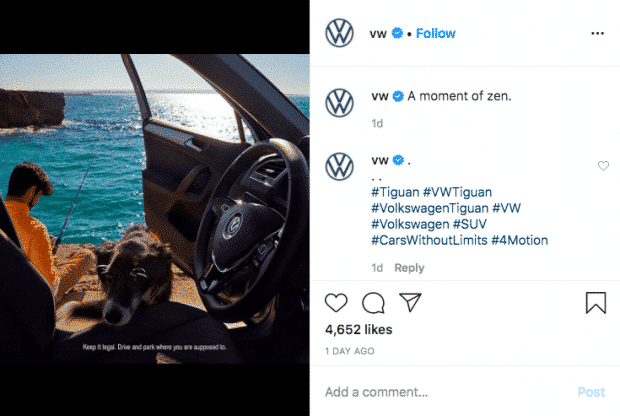
Source:VW on Instagram
You can also use hashtags within the caption itself without them being super-visible.
You can hide hashtags on Instagram Stories, too. One option is simply to minimize the appearance of your hashtags by pinching and shrinking them to make them quite small. You can also tap the hashtag sticker to change it from a white background to a semi-transparent one.
If you want to hide your hashtags entirely, you can paste an emoji, sticker, or GIF overtop to obscure them.

Source:Christina Newberry
Unlike Twitter, Instagram doesn’t publicize a list of trending hashtags. However, if you search for a hashtag on Instagram, you’ll see how many posts use that hashtag. You’ll also see a list of other popular Instagram hashtags using similar words, with post counts included too.
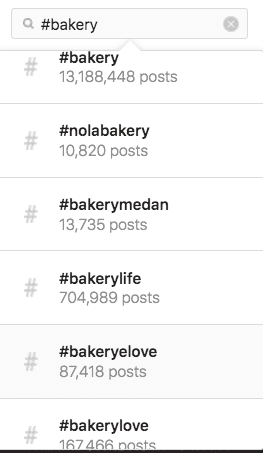
Source:Instagram
To search for a hashtag on desktop, enter the hashtag including the # symbol into the search box. On mobile, enter your search term in the search box, then tapTags.
If you’re paying attention to your Instagram feed, you’ll learn to quickly spot trending hashtags as they emerge. Don’t be too quick to jump on a trend, though. Only post using a trending hashtag if it really makes sense for your business, and for the specific content in your post.
The easiest way to search multiple hashtags on Instagram is to set up search streams in a social listening tool likeHootsuiteto track the hashtags you’re interested in so you can see all the relevant content on one screen without having to conduct each one as an individual Instagram hashtag search.

Source:Hootsuite
Instagram business profiles can conduct up to 30 unique hashtag searches in any given seven-day period.
We wrote a full post about thebenefits of social listeningif you want to dig deeper into how this works.
Here’s the truth. You could upload your photo to one of the many Instagram hashtag generators out there and get a bunch of free suggestions for hashtags. But, these suggestions aren’t going to be as strategic and effective as doing the research yourself.
Here’s some tips to try for coming up with Instagram hashtags that will actually drive reach and engagement.
You don’t necessarily want to model your competition’s strategy too closely, but taking a look at the hashtags they use can give you some good clues about what’s working for others in your industry.
Maybe you’ll discover new hashtags to add to your repertoire. Or you could decide you don’t want to compete for the same eyeballs, in which case you can search for alternative hashtags to use.
After all, if your audience is already using a certain hashtag, then other people just like them are probably using it too. Finding these existing Instagram communities is a great way to expand your audience and reach the people who are most likely to be interested in your business.
Keep an eye on your top followers and see what hashtags they’re using. Instagram’s search tool can give you some additional information about which hashtags the people you follow care about. When you conduct an Instagram hashtag search, the search tool will show you if anyone you follow also follows that hashtag. (Note that this only works on mobile, not on desktop.)

Source:Instagram
On any hashtag page, right above the “Top” and “Recent” tabs, you’ll find a list of related hashtags that you can scroll through by swiping left.
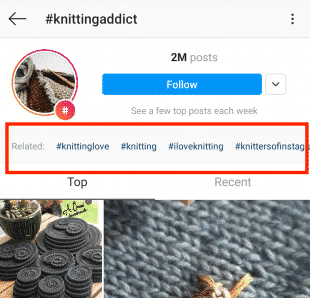
Source:Instagram
This is a great way to find relevant hashtags that might be a bit more niche than the big keyword-based hashtags you originally searched for. That means a more targeted audience with less content to compete with. These can be some of the best hashtags for Instagram brands wanting to connect with passionate communities.
The best hashtag for your brand may be one you create yourself. A branded hashtag is simply a tag that you create to promote your own brand or campaign.
You can then let your audience know about your hashtag by including it in your Instagram bio and highlighting it in your captions and Instagram Stories. You could also consider running acontestwith a branded hashtag to popularize the hashtag while also collectinguser-generated content.

Source:Lululemon on Instagram
Make sure to follow your branded hashtag, both within the Instagram app and using a stream in your social media dashboard, so you can monitor how it’s being used. Look for opportunities to reshare great content or connect with influential members of your audience.
To follow a hashtag within Instagram, simply tap it, then tap the blueFollowbutton on the hashtag page.
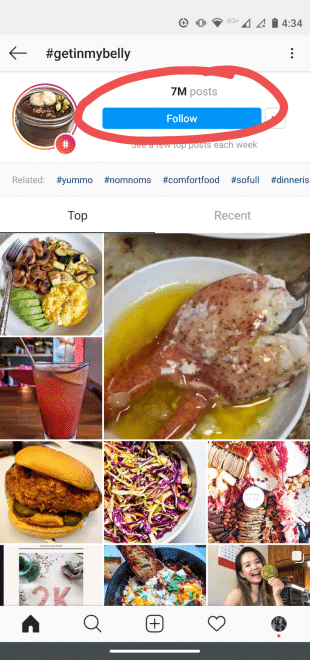
Source:Instagram
Coming up with the right hashtags for every. single. post. is a lot of work.
Enter: Hootsuite’s hashtag generator.
Whenever you’re creating a post in Composer, Hootsuite’s AI technology will recommend a custom set of hashtags based on your draft — the tool analyzes both your caption and the images you’ve uploaded to suggest the most relevant tags.
To use Hootsuite’s hashtag generator, follow these steps:
That’s it!
The hashtags you selected will be added to your post. You can go ahead and publish it or schedule it for later.
If you’ve made theswitch to an Instagram business profile, you have access to post insights that tell you how many impressions you received from hashtags.
1. Select the post you want data on and tapView Insightsbelow the post on the left.
2. Swipe up to see all the insights for that post, including the number of impressions from hashtags.

This data helps you figure out which hashtags are most effective for improving reach.
Hashtag pages have an Instagram Story icon in the top left corner. Click on it and you’ll see a collection of Stories posts tagged with the hashtag from people with public profiles.
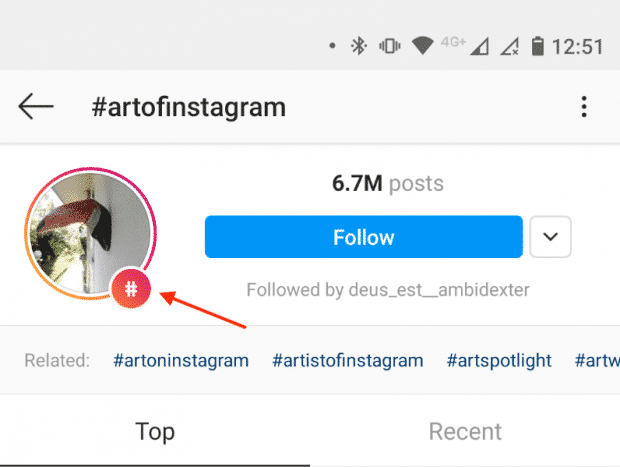
Source:Instagram
There are two ways to add hashtags to your Stories. The first method is to use the hashtag sticker.
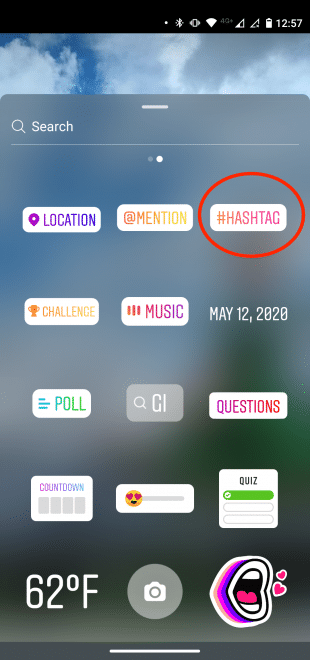
Source:Instagram
Or you can simply use the text tool and the # symbol to type out the hashtag the same way you would on a photo or video post.
When inappropriate content becomes associated with a hashtag, Instagram might ban that hashtag.
This doesn’t mean that you can’t use it at all. Instead, it means that if you click on the tag, you will only see top posts. You won’t see recent posts, and there won’t be any Stories associated with the hashtag.
Here’s what it looks like when you run into a banned hashtag:

Source:Instagram
The only way to know if a hashtag is banned is to check it before you use it. This is a good practice to put in place every time you add a new hashtag to your repertoire. Using banned hashtags can cause a drop in engagement, as your use of legitimate hashtags might also become less effective because you could be dropped in thealgorithm.
Even if they’re not banned, you should avoid hashtags that shamelessly solicit likes and followers. Examples include #followme, #like4like, #follow4follow, #tagsforlikes, and so on.
Using these will attract bots, spammers, and other Instagram users who have no intention of engaging with you in any meaningful way. They also show your followers that your brand is okay with engaging in spammy behaviour. And that’s not a good look.
标签页是一个伟大的方式来揭露你的小故事nt to a new audience, especially if you can get featured in the Top section.
Hashtag pages show off all the content associated with a specific hashtag. If someone searches for a post and yours is the most recent with that hashtag, it will be the first thing they see in the Recent section.
Of course, it’s much easier to stay at the top of the Recent section for a less-popular or really niche hashtag.
Keep in mind that the Recent section is sorted based on when each post was originally shared. If you add hashtags later, either through a comment or by editing the caption, this won’t bump your post up for recency.
It might be tempting to simply copy and paste the same long list of hashtags on every post, but don’t do it.Instagram’s community guidelinesclearly state that “posting repetitive comments or content” is not okay. If you use the same hashtags for every post, your content will be penalized by the algorithm.
When you create a post, only use hashtags that make sense. If you tag a post with #wanderlust, for example, your content must be something globetrotters will want to comment on, like, and share.
这不是关于被很多人,它’s about getting seen by the right people. That’s how hashtags lead to higher engagement and more followers. Pick and choose the right keywords for each post individually.
Hashtags are often a string of words stuck together. That can create some problems when it’s not clear where one word ends and the next begins.
One of the worst examples of this was the #susanalbumparty fiasco from way back in 2012. It was a launch celebration hashtag for Susan Boyle’s new album. But read it slowly and you might pick up some words in the middle that clearly make the hashtag a bit… problematic.
Amazon played with this kind of hashtag mistake to promote Top Gear. This was done on purpose, but it would be an easy mistake to combine a possessive “s” and the word “hit” by accident.
Brands sometimes also are too keen to hop onto a trending hashtag without fully understanding the context. When the context is challenging, this can create aPR disasterfor the brand.
And sometimes a brand just doesn’t check to see if a hashtag is already in use before creating a whole campaign. Burger King was guilty of this back in 2013, when they used the hashtag #WTFF to mean “What The French Fry.”
Since you already know what WTF stands for, you can probably guess why this was a problem.
If you often use the same hashtags, you can save them in a note to reduce time typing them in over and over.
Wait, didn’t we just tell you not to use the same hashtags on every post? It’s true—you should not overuse the same set of hashtags. That said, it is still really useful to have a list of hashtags relevant to the various kinds of content you post. You could even create separate lists of hashtags relevant to the different types of posts you create.
Just create a list of hashtags in your notes app, ready to add to your posts.
You can then pick and choose a few hashtags to use each time, rather than having to remember the hashtags or search for new ones for each post. This also gives you the time to check out what kind of content is already being posted for these hashtags, so you don’t make one of the mistakes mentioned above.
Just remember that every one of the Instagram hashtags you use on a post must fit with the content and should not be too repetitive. Don’t copy and paste your whole saved list onto every post.
Manage your entire Instagram presence and save time with Hootsuite. Schedule posts and Stories, find the best hashtags, easily engage the audience, measure performance, and more. Try it free today.
Boost engagement and save timewith a hashtag generator, post templates, Canva, and Grammarly Pro in Hootsuite.
Free 60-Day Trial
